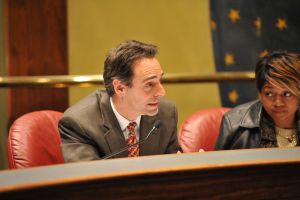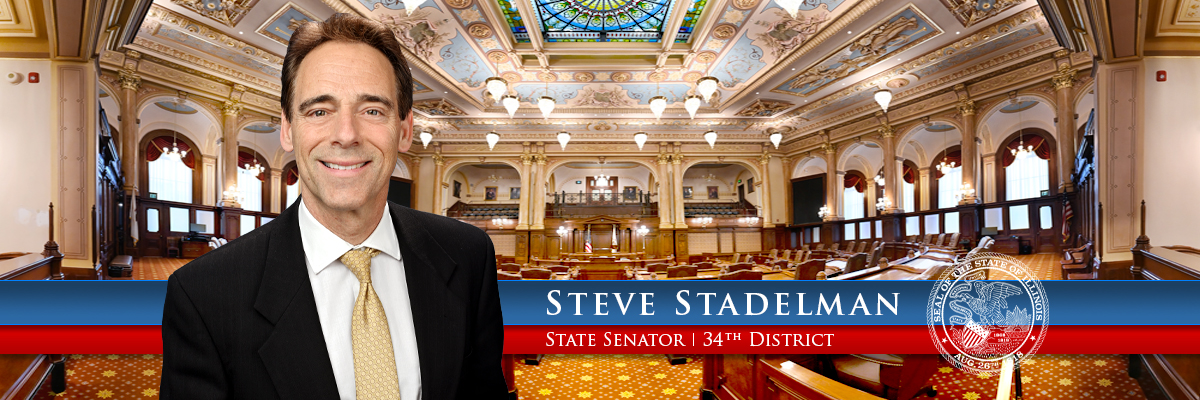Stadelman urging local fire departments to apply for Small Equipment Grant Program
- Details
- Category: Press Releases

ROCKFORD – State Senator Steve Stadelman (D-Rockford) is urging local fire departments to apply for The Office of the State Fire Marshal’s Small Equipment Grant program.
“This is another great opportunity for local fire departments and ambulance services to continue to best serve our community,” Stadelman said. “As COVID-19 cases continue to rise, additional funding for our first responders is needed more than ever to help keep them safe.”
All interested departments should send an application to OSFM no later than January 29, 2021. OSFM will award $3.3 million to eligible fire departments and ambulance services during this application period. The program was created to provide grants of up to $26,000 for the purchase of small firefighting and ambulance equipment.
“Our local first responders need additional PPE to do their jobs safely, and these grants will help secure those supplies,” Stadelman said. “We need to make sure they stay as safe and healthy as possible, so they can continue to do the life saving work we all benefit from every single day.”
The purpose of the program is to allow eligible applicants the opportunity to purchase small tools and equipment that they may otherwise not be able to purchase. In addition to firefighting personal protective equipment, applicants can also apply for personal infection control items such as masks, gowns and gloves.
Most Illinois fire departments, fire protection districts and township fire departments are eligible to apply. In addition, stand-alone, not-for-profit ambulance service providers are also eligible.
Additional information including the application can be found on the OSFM’s website.
Stadelman announces $6.85 million grant for Rockford Mass Transit District
- Details
- Category: Press Releases

ROCKFORD – The Illinois Department of Transportation announced Friday that over $350 million in funding is set to be allocated as part of the Rebuild Illinois Capital Project. State Senator Steve Stadelman (D-Rockford) is pleased to announced that the Rockford Mass Transit District will receive a portion of those funds.
“The Rebuild Illinois project is a great way for the state to make much needed and long-overdue infrastructure improvements, and I’m pleased that the Rockford Mass Transit District will be receiving a grant,” Stadelman said. “Every day, thousands of people rely on the RMTD to get to and from home, work or school or to visit one of the countless local businesses that make our city great. With this grant, they’ll be able to provide a better and safer experience for riders, which is even more crucial during a global pandemic that is causing people to rethink their travel habits.”
IDOT will provide the RMTD with $6.85 million, which will be used for various maintenance related projects including:
- The purchase of new paratransit units and alternative fuel buses to replace existing vehicles that have reached the end of their lifespan;
- The purchase of technology, including radios, computer tablets, cameras and automatic passengers counters, to help enhance safety, improve operation connectivity, and streamline the process of transferring to the Stateline Mass Transit District; and
- The design, construction, purchase and installation of various electric and power equipment to reduce levels of energy consumption and greenhouse gas emission.
“These funds will go a long way toward helping the Rockford Mass Transit District provide a more modern, efficient service that will greatly benefit those who use the system as well as the city of Rockford as a whole,” Stadelman said.
Friday’s announcement was the first of three grant distribution cycles, with the subsequent two scheduled to be released in 2021 and 2023. A full list of grant recipients from the first cycle can be found here.
Stadelman encourages uninsured Illinoisans to visit ACA marketplace
- Details
- Category: Press Releases

ROCKFORD – State Senator Steve Stadelman (D-Rockford) is encouraging uninsured and underinsured Illinoisans to visit the Affordable Care Act Marketplace during the open enrollment period, which runs from Nov. 1 to Dec. 15.
“No matter how healthy you may be, everyone benefits from having health insurance,” Stadelman said. “Open enrollment for the ACA Marketplace has arrived, and you can find or change insurance if you don’t received insurance from an employer or qualify for Medicaid.”
This year, Illinoisans will be able to choose from 179 plans from eight insurance providers. There are also tax credits available to help lower-income residents reduce their monthly payments and find affordable coverage.
Last year, more than 240,000 people received tax credits, and after credits were applied, the average monthly payment was $153.
There are three tiers of coverage to choose from that balance coverage and cost: Gold, Silver and Bronze. Anyone who is already covered under an ACA plan will automatically be enrolled in the same or a similar plan if they don’t make a different selection.
“We’re in the middle of a pandemic, so it’s more important than ever to have coverage,” Stadelman said.
Stadelman also want to remind people that if you experience a life-changing event, such as an income loss, a marriage, or a major move, you can always visit the marketplace – even if the open enrollment period has closed.
To learn more or select a plan, Illinois residents can visit https://getcoveredillinois.gov.
Stadelman announces completion of I-39 and other major road projects
- Details
- Category: Press Releases

ROCKFORD – State Senator Steve Stadelman (D-Rockford) is pleased to report that the Illinois Department of Transportation announced Friday that I-39 resurfacing and two other major projects that will enhance safety while helping to grow the regional economy are wrapping up.
The projects represent a total investment of more than $55 million in the region.
“These projects helped create jobs and set the Rockford region up for economic opportunity for years to come,” Stadelman said. “Maintaining our roads and bridges is vitally important.”
Projects near completion include:
- Interstate 39 resurfacing – The $20 million project installed new guardrail and resurfaced I-39 from Baxter Road to Harris Avenue, along with U.S. 20 from just west of Alpine Road to I-39.
- U.S. 20-Illinois 2 interchange – The $24 million project reconfigured the cloverleaf interchange at U.S. 20 and Illinois 2 to a signalized diamond interchange. The project also rebuilt the dual structure bridge that carries U.S. 20 over Illinois 2.
- Illinois 251 rehabilitation – The $11.8 million project patched and resurfaced I251, from Forrest Hills Road, in Machesney Park, to the Wisconsin state line.
“Not only do these projects benefit the Rockford area today, but for years to come,” Stadelman said.
Although construction is substantially complete, some additional work remains, including landscaping. Daily lane closures will be required through early November to complete the work.
Over the next six years, IDOT is planning to improve more than 3,300 miles of highway and 8.4 million square feet of bridge deck as part of the Rebuild Illinois statewide construction program championed by Stadelman.
More Articles …
Page 68 of 125




